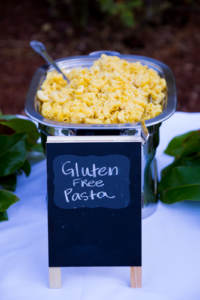Food, Hospitality, and Your Wedding: Dealing With Allergies and Restrictions
 Your wedding isn’t just an opportunity to express your shared love and commitment. It’s also an occasion in which you’ll ask your family, friends, and other significant people in your social circle to celebrate that love and happiness with you. As their hosts, you take on several key responsibilities to ensure your guests’ enjoyment and comfort. How do you ensure that everyone can partake in the food and drink you offer at your reception, especially when dietary restrictions and food allergies pose a challenge? With some smart practices, you can accommodate them successfully while offering a delicious menu to everyone.
Your wedding isn’t just an opportunity to express your shared love and commitment. It’s also an occasion in which you’ll ask your family, friends, and other significant people in your social circle to celebrate that love and happiness with you. As their hosts, you take on several key responsibilities to ensure your guests’ enjoyment and comfort. How do you ensure that everyone can partake in the food and drink you offer at your reception, especially when dietary restrictions and food allergies pose a challenge? With some smart practices, you can accommodate them successfully while offering a delicious menu to everyone.
Common Food Allergies and Intolerances
Unless you have dietary issues and food allergies yourself, it can be hard to make sense of all the restrictions your guests deal with when navigating their food choices. The American College of Allergy, Asthma & Immunology lists several conditions that make up about 90 percent of all food allergies and negative reactions:
- Nut, egg, and shellfish allergies
- Gluten and lactose intolerance
- Corn, wheat, and soybean allergies
- Meat and seafood allergies
Individuals with these types of intolerances can experience moderate to severe symptoms ranging from hives, vomiting, and a swollen tongue and throat to anaphylaxis, a potentially fatal condition that can result in lowered blood pressure, increased heart rate, and trouble breathing.
Other typical culprits include fermentable short-chain carbohydrates, present in many kinds of vegetables, fruits, legumes, and dairy products. Harvard Medical School explains that people with irritable bowel syndrome cannot easily digest these compounds, so they can trigger symptoms such as diarrhea, stomach cramps, bloating, and excess gas.
Religious and Other Dietary Choices
Besides common allergies and intolerances, you may find other health-related and religious dietary restrictions among your guests. People with diabetes, high blood pressure, or an elevated risk for heart attacks, or who already have coronary artery disease, often must avoid food that’s high in fat, salt, and simple carbohydrates.
For religious or health reasons or due to matters of conscience, vegetarians usually steer clear of meat, poultry, and fish, while vegans do not eat any animal products whatsoever. Meanwhile, kosher dietary laws followed by many Jewish people and halal laws for Muslims specify certain food and drink that is either permitted or restricted, along with specific preparation guidelines.
How Can You Accommodate Your Guests?
As you can imagine, communication with your guests and collaborating with your caterers are the ideal approaches to ensuring that all your guests can enjoy your reception meal. Joy’s wedding blog offers several tips for accommodating them during your planning process. You’ll want to ask your guests for information about their dietary needs in your wedding invitations. Include a space on the RSVP card for their responses, and don’t forget to reach out and request clarification for any that you don’t understand. After all, you’ll need to communicate this information to your caterer so you can work up a menu and possible substitute dishes. Other suggestions can also make your life – and your guests’ lives – easier:
- Buffets can allow you to accommodate multiple dietary restrictions.
- Dishes should be labeled. You can label according to dietary needs or by listing each food’s ingredients.
- Every dish should be stored separately to avoid cross-contamination.
- Provide more of each special food option than what you think you’ll need, since guests without dietary restrictions may also partake.
Accommodation Is Essential Hospitality
Dietary restrictions can present challenges for both hosts and their guests. Nevertheless, you can overcome them with just a bit of diligent planning and legwork. By communicating with your guests and caterer, along with labeling and knowing what goes into food preparation, you can offer your attendees an awesome meal at your wedding reception.














